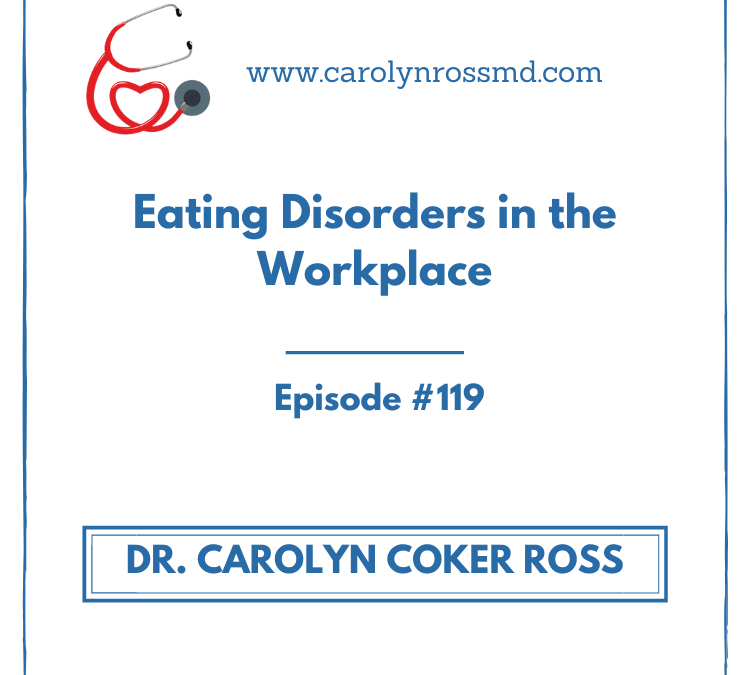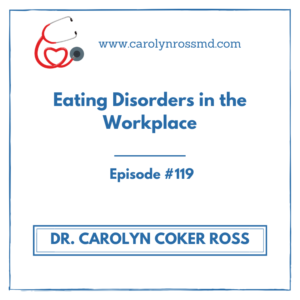We spend about a third of our adult lives in the workplace. Work can improve mental health for some individuals – providing them with a sense of meaning and purpose and offering valuable social connections. However, for individuals with binge eating disorder, food addiction or emotional eating, work can also be a source of stress and stigma that can make their eating disorder worse or can lead to relapse.
In this podcast, you will learn:
1. How the workplace can be a trigger for people with eating disorders.
2. How having an eating disorder can make workplace stress worse.
3. What are 3 actions you can take so reduce relapse or triggers in the workplace.
If you are planning to speak to your HR department at work and need some information to help educate them, here is a guide.
Finding fashionable plus-size clothes
https://www.vogue.com/article/navigating-workplace-fashion-as-a-plus-size-person
For more information about The Anchor Program or to schedule your FREE consult: AnchorProgram.com
Don’t miss the upcoming Fall Anchor Program. Schedule a free consult to discuss your food and body image issues: https://findingyouranchor.as.me/consult
Get a free copy of The Food Addiction Recovery Workbook” (I pay for the book, you pay for postage/ handling) foodaddictionrecoveryworkbook.com
Use this link to get your free e-book of “The Food Addiction Recovery Workbook.” (you pay for handling charge only),
https://www.foodaddictionrecoveryworkbook.com/ebook
Hi everybody. Dr. Carolyn here, and today I’m gonna be talking to you about eating disorders in the workplace. So employment has been linked to improvements in mental health status. In other words, if you love your job, you have a great community of friends and coworkers that could improve your mental health, and it can even improve recovery from mental health issues. But it can also be a barrier to recovery in eating Disorder is one of those places where the workplace can trigger relapse. Now, almost a third of our adult lives are spent at work. Can you believe it? Well, I can. I feel like it’s more than that actually. And therefore it makes sense that many women struggling with binge eating disorder, food addiction, and emotional eating are gonna be in the workplace. And for many, they have to be working because of the financial burden of their eating disorders. That could be a driving force for them trying to keep their jobs. So for example, they have to go into treatment, so they need to keep their insurance or maybe they are spending a lot of money on their binges and that has necessitated them staying at a job that they may otherwise have left. But just the nature of workplace life can make it difficult, you know, to balance work demands with mental health demands. Especially if you do have an eating disorder.
So stigma and stress are two of the problems that can be highlighted and magnified in the workplace. So if you have an eating disorder, not everybody knows, particularly if you tend to be thin. However, for those living in larger bodies, weight stigma can really be a problem at work. As well the workplace can be a fertile ground for, you know, what the diet mentality with discussions about weight loss, or why don’t you join me on this new diet? I found, or talking about anything to do with body size and the number on the scale.
So one of my patients, for example, in the anchor program said that a coworker started telling her about a new “wellness challenge”, which in my opinion is a buzzword for weight loss challenge. And she was encouraging her to join her. And she was talking about how she was looking forward to it and how much weight she was losing, et cetera. And then she kind of slightly asked my patient, well, why don’t you join us? Why don’t you, you know, it would be good for you. So this made my patient feel as if she was yet again being judged about her size. Now, luckily, she was able to say, You know what? I have an eating disorder and I know that going on diets will only make my eating disorder worse. So that was her way of, in an empowered stance, saying, I don’t wanna have this diet mentality conversation anymore.
But this type of stress at work can lead to a loss of job satisfaction, absenteeism, burnout, and wanting to leave work. Experiencing stress at work can also have an effect on your psychological wellbeing. So if you have binge eating disorder, food addiction, or emotional eating, you may realize that there is a unique connection between workplace stress and your peace of mind. Workplace stress can make eating disorders worse, and having an eating disorder can make it harder to cope with workplace stress.
Now stressful life events that have to do with your job have been shown to increase eating disorder behaviors as I mentioned before, causing relapse. And many of my patients with eating disorders anyway are also perfectionistic and this can make the stress you’re experiencing at work even worse and again can lead to relapse.
Now often the stigma that is experienced by people with eating disorders is expanded to include, particularly for those living in larger bodies. It’s expanded to include being judged as incompetent, lazy, untrustworthy, unpredictable, and so on. Now, we know that’s not true, but that is part of the weight stigma mentality. Now, these judgements really have a marked consequences on a person’s ability to get a raise at work, be promoted, or even just to receive the recognition they desire for, or they deserve for doing a good job.
Studies have shown that stigma related to eating disorders include even more attributes than stigma against people with other mental health issues like depression, schizophrenia, panic attacks, and dementia. Often people with eating disorders have the experience that their concerns are not taken seriously and they are blamed for things that they’re not responsible for.
So women in larger bodies can get a double whammy of stigma. The one about having an eating disorder and also weight specific stigma. So what are some of the ways that your workplace may be affecting you? So here are some situations that I’ve heard from my patients in the anchor program are about how they’re impacted a work. Number one, office furniture that’s not designed for larger bodies in mind. Number two, frequent work events that focus on food and can be a trigger for those with eating disorders. Number three, comments and backhanded comments like, You have such a pretty face why don’t you lose weight. That can come from coworkers about the latest diet fads and how much weight they’re losing and asking you to join them on these diets as I showed in the example above. Number four, food left out at work, people randomly bringing in food to share. And number five, workplace wellness programs and challenges that focus specifically on weight loss although they are advertised as being wellness or health related challenges. Number six, finding professional stylish clothes to where to work. And I’ve read a great blog about that recently and I’ve put the link to that blog in the show notes.
Now, what does getting help look like for workplace stress or stigma? If you have binge eating disorder, food addiction, or emotional eating, you may wanna think and make a list of all the ways in which your workplace affects your eating disorder. So, for example, some questions you can look at. Number one, what limitations are you experiencing in work? Number two, how are these limitations affecting your ability to do your work and your eating disorder recovery? And number three, what stresses at your workplace directly impact your eating disorder recovery? And I’ll put those questions in the show notes.
Now, what we’re talking about when we talk about eating disorders in the workplace is literally how trauma shows up in the workplace. An important truth is that wherever you go, you take your trauma with you. And as I’ve talked about on my podcast numerous times, eating disorders such as binge eating, emotional eating, and food addiction have their roots in childhood trauma. Since trauma impacts over 60% of Americans and severe trauma impacts 20% of Americans, and we do take our trauma to work with us, you know that there are gonna be other people at work with you who have also experienced some trauma. And their trauma may show up as needing disorder, that they’re hiding, or it may show up as anxiety and depression or substance use disorders, use of alcohol and drugs.
Now, most people who take their trauma with them do not realize that’s what’s causing them to, for example, be a people pleaser because their trauma led them to the belief that they don’t matter. As well, few HR directors or company CEOs understand how trauma can impact the workplace. When you find yourself using food to deal with workplace issues or workplace stress, you can know that your trauma has been triggered by the events at work that throw you into the your pattern or make you feel that something is wrong with you, all of which comes from your trauma.
While we can’t change the past, it is important to understand how your past childhood trauma plays out in your life now. The advantage for you to address limitations at work is better work enjoyment or work satisfaction, more connection with coworkers and so on, but it’s your decision and only you know what is best for you. If you have the fear and maybe have had the experience that there’s a lot of weight stigma or stigma against mental health issues at work, it may not be the appropriate time for you to address that or the appropriate place for you to address it. So it’s important for you to be honest with yourself and at least to be more aware of how your workplace is impacting your eating disorder or your eating disorder recovery.
So internalized weight stigma is something I’ve spoken about in the past as well. That means that you are internalizing the stigma that we see against weight in our society. So it’s not just about what other people say to you, it’s also about what you say to yourself. And you may still be buying into thoughts that you should be able to avoid going to the snack room, or you should go on the next fad diet, or you should be able to use your willpower to deal with other unwanted behaviors, triggers, or response to stress. And I’ll be talking more about combating internalized weight stigma in an upcoming program. For now take a look at your workplace environment and experiences and see if you can identify any ways to modify the workplace so that that will support your eating disorder recovery, psychological health and wellbeing.
Okay, this is Dr. Carolyn signing off. I’ll see you next time.









